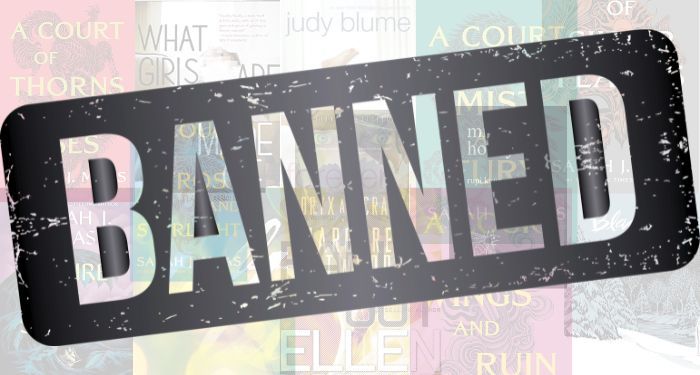
Utah Bans 13 Books From Public Schools Statewide
After passing one of the most restrictive book banning measures in the country, the state of Utah has released its list of books to be banned from schools across the state. House Bill 29 allows parents to challenge books they deem “sensitive material” while also outright banning books from public schools if those books have been deemed “objective sensitive material” or “pornographic” per state code in at least three school districts or two school districts and five charter schools statewide.
The law, which went into effect July 1, applied retroactively, meaning that every school needed to submit to the Utah State Board of Education the titles that had been deemed against the law in their district. Now, any time a public or charter school removes a book deemed “sensitive material,” they must notify the State Board of Education. If that book now meets the threshold of removals, all schools will be notified and expected to dispose of it.
On Friday afternoon, August 2, the Utah State Board of Education released its first official list of books that all public schools need to remove from shelves. They are:
- Blankets by Craig Thompson (2003)
- A Court of Frost and Starlight by Sarah J. Maas (2018)
- A Court of Mist and Fury by Sarah J. Maas (2016)
- A Court of Silver Flames by Sarah J. Maas (2021)
- A Court of Thorns and Roses by Sarah J. Maas (2015)
- A Court of Wings and Ruin by Sarah J. Maas (2017)
- Empire of Storms by Sarah J. Maas (2016)
- Fallout by Ellen Hopkins (2010)
- Forever by Judy Blume (1975)
- Milk and Honey by Rupi Kaur (2014)
- Oryx & Crake by Margaret Atwood (2003)
- Tilt by Ellen Hopkins (2012)
- What Girls Are Made Of by Elana K. Arnold (2017)
Every public school in the state is now required to dispose of the books. It is unclear how districts plan to get rid of the books, as the law only makes two stipulations: the books cannot be sold or distributed. It is up to each district to create a policy, begging the question of what other methods of disposal will be implemented.
The books on this list represent some of the most popular targets by book banners and groups championing the “parental rights” cause, including Utah Parents United and Moms For Liberty. RatedBooks, the book review database created by Utah Parents United’s, and BookLooks, the book review database created by Moms For Liberty, work in conjunction with one another; you’ll see all 13 titles represented in both of these parent-created databases. All 13, with the exception of Ellen Hopkins’s Fallout, garner a rating of 4/5, or “not for minors.” Fallout earned a 3/5, or “minor restricted.” These databases are created by volunteers without regard for the professional reviews and ratings already applied to the books at the time of their publication.
Moreover, most of these books are far from new, highlighting that the so-called problem of pornography in schools appeared only when it was a convenient talking point. The average publication date of the books banned by the state of Utah is 2011, or 13 years ago.
The list is not only a clear statement about the power a few can wield but it is also a statement about the state of public education. These book bans apply only to public schools, opening up the convenient argument from those power-wielding groups that if other parents don’t like the decision, they can simply send their students to private school or homeschool them. Utah also passed an updated voucher scheme this past legislative session.
Where many of the fights over book bans nationwide have relied on the “local control” argument–i.e., that each community should decide what is “appropriate” there–Utah’s bill strips that away. Now, only three public school districts can do the decision-making for the entire state. As the Salt Lake Tribune reported, two districts in the state banned all 13 of the above titles, while two more banned seven of them. Only four school districts decided the fate of books statewide. Utah has 42 public school districts.
This won’t be the only state-enforced book ban list to come out of Utah, and it is a startling reminder of what’s currently at stake when it comes to the First Amendment. None of these books meets the legal definition of pornography nor sensitive material.
Moreover, Utah’s law is likely a harbinger of similar bills to come in other states next legislative session. While draconian book ban laws are currently on hold in Texas and in Iowa, state-sanctioned book banning laws passed in Idaho, Tennessee, and South Carolina this year.
Let Utah Read encourages all state residents to send a letter to legislators and to Governor Cox demanding the law be fixed.







